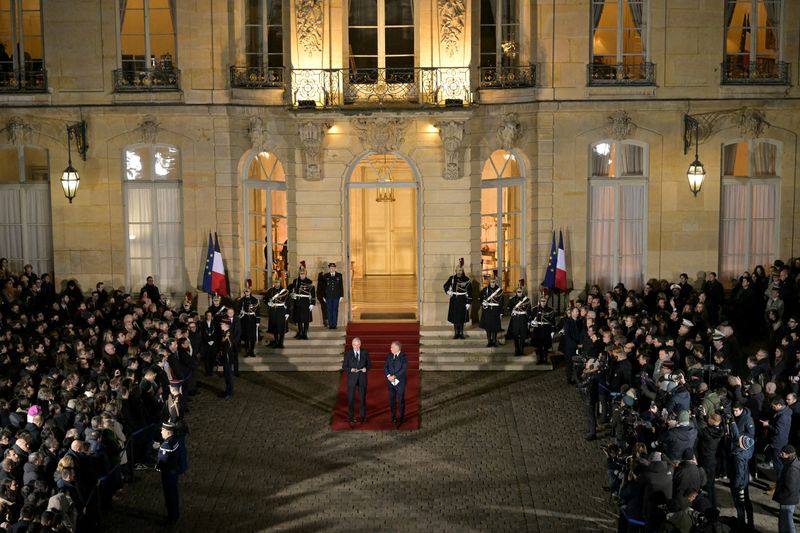By Michel Rose
PARIS (Reuters) – When veteran centrist Francois Bayrou, France’s new prime minister, was schooling minister within the Nineteen Nineties, his plan to extend subsidies for personal faculties led to nationwide protests. He shortly caved in and would keep within the put up for 4 extra years.
Three a long time later he’ll face a special power within the form of a fractured and fractious parliament the place one in all his earliest duties – as President Emmanuel Macron’s fourth prime minister of the yr – will likely be to go a funds for 2025.
First he should identify a authorities which, like that of his predecessor Michel Barnier, could have minority assist in parliament and be weak to assault from far-right and left-wing opponents.
The ouster of Barnier and his cupboard – the primary time France’s parliament had voted to take away a authorities since 1962 – appeared to stun even these behind the transfer. For now, there may be cross-party assist for emergency laws to make sure authorities funding doesn’t dry up – however then the arduous work on a funds for subsequent yr will start.
“The difficulties remain the same as under Michel Barnier,” Arnaud Benedetti, a professor on the Sorbonne college, advised Reuters. “At least, a motion of no-confidence doesn’t seem likely in the very short-term.”
A Macron aide mentioned Bayrou was the “most consensual candidate able to bring people together.” Socialists mentioned he represented extra of the identical.
A profession politician, Bayrou, 73, was the torch-bearer of centrism till Macron reshaped the political panorama in 2017, dynamiting the normal mainstream events in a marketing campaign Bayrou rallied behind.
Bayrou has previously talked powerful on the dangers posed by France’s rising debt pile.
He did so once more on Friday, saying the nation’s debt was a “moral problem” as a lot as a monetary one. “I hear your warning on the seriousness of the situation and I agree,” he advised Barnier.
However he has positioned a excessive worth on protecting the peace, whether or not with the unions, lawmakers or the myriad of highly effective vested pursuits in France.
Preserving the peace in a Nationwide Meeting dominated by three warring factions will likely be nigh-on unattainable, nevertheless.
Lawmakers’ pushback over the 2025 funds invoice led to Barnier’s downfall and left-wing leaders say they could attempt to topple Bayrou ought to he additionally use particular constitutional powers to ram by the funds with out a vote in parliament.
“Bringing onboard demands from opposition parties may be fiscally costly and the degree of fiscal consolidation may be limited next year as a result,” mentioned JP Morgan’s Raphael Brun-Aguerre in a be aware.
FAR-RIGHT’S BUDGET RED LINES ENDURE
Via the week Macron held talks with get together chiefs spanning the centre-right Republicans to the Communists.
He appealed to all ‘Republican forces’ to unite however opted to withstand Socialist Social gathering calls to nominate a premier from inside their ranks, unwilling to threat unwinding reforms that liberalised the euro zone’s second-largest financial system and positioned the pension system on a extra financially sound footing.
Even so, the president’s 2023 pension reform will stay in his opponents’ crosshairs.
“Our red lines remain,” Jordan Bardella, chief of the far-right Nationwide Rally advised reporters shortly after Bayrou was named. These pink strains embrace indexing pensions to inflation all through 2025.
One opinion ballot this week confirmed that 35%-38% of voters supposed to assist Bardella’s boss, Marine Le Pen, within the subsequent presidential election due in 2027 – a stage not seen earlier than for the far-right chief and placing her within the lead.
Moreover, even when Bayrou’s political opponents don’t get in the way in which, the challenges for his future authorities will likely be immense.
It might want to scale back the funds deficit from a projected 6.1% for 2024 while protecting protest-prone commerce unions at bay, rising army spending for Ukraine and discovering methods to assist an ailing industrial sector.
Barnier had promised to deliver the deficit down with tax rises for the rich and for large corporations, in addition to a curbs on the deliberate rise in pension funds. However these measures fell by the wayside when his authorities was toppled.

Former finance minister Bruno Le Maire, who has been grilled by lawmakers investigating his function in France’s failure to curb its deficit, gave a scathing indictment of parliament.
“This assembly taxes, spends, censors,” he mentioned. “It has long lost any sense of economic and budget realities.”




